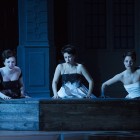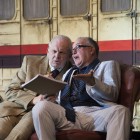Ariadne on Naxos 2018Scottish Opera
Read more about the opera Ariadne auf Naxos
Scottish Opera's third production of Ariadne looked highly promising. Several of the cast were unknown here, but Jennifer France was an excellent choice for the spectacular Zerbinetta. The Prologue certainly got things off to a rousing start - Sir Thomas Allen had not appeared on a Scottish Opera stage since 1981, and Jamie Macdougall was actually making his company debut in an opera!
Antony McDonald's production generally worked well. The whole show was given a contemporary setting, at the home of the 'richest man in Glasgow'. Several of the Prologue characters were therefore updated, so the Music Master and Dancing Master became a Professor of Composition and a Producer. The household servant, or 'Lackey', became a Butler. Best of all, the Major-Domo became a Party Planner, given a razor-sharp performance (in cut-glass Glaswegian tones) by the wonderful Eleanor Bron.
The Prologue was performed in English translation, with the Opera following in German. The veteran baritone already mentioned gave a superbly detailed performance, and Alasdair Elliott slotted in seamlessly. The youthful composer, identified as a female character, rather than the usual travesti part, was given a delightfully impetuous performance by Julia Sporsén. Zerbinetta and the comedians all made an immediate, well differentiated, impact. Two recent alumni of the Conservatoire, Alexey Gusev and Richard Shaffrey, both shone in their brief appearances.
The main design features in the prologue were three caravans, being the temporary dressing rooms for the visiting artists. The prima donna's (of course) substantially bigger than the tenor's, both stage left. To the right was a larger one, split into two rooms, one for Zerbinetta, the second for the quartet. This allowed clear delineation of interaction of the characters. Zerbinetta entertained her gentleman callers quite openly - not just Harlequin, constantly trying to assert his supremacy, but also the Officer in full dress scarlet mess jacket and kilt - a rare splash of colour in an otherwise rather monochrome design palette.
The design for the opera proper was far simpler, and the lack of visual contrast was perhaps the only drawback in the staging. Ariadne and her three nymphs were richly costumed. The trio were given more to do than is usually the case in this frequently rather static piece. The singing of all four ladies was excellent, with Mardi Byers displaying a lustrous soprano, beautifully controlled, and ideal for Strauss's arching phrases. Jennifer France continued with her delightful performance, even including a striptease during her faultless rendering of her showpiece aria. The Bacchus was also a new visitor, in Dutch tenor Kor-Jan Dusseljee. This short but highly exposed role can be difficult to cast, but he threw off all its challenges with aplomb - an unusually bright tone for a heldentenor.
On the evening of 22 March the centre of Glasgow was seriously affected by a fire in a night club in Sauchiehall Street, fortunately with no casualties. However the beautiful Pavilion Theatre was immediately adjacent to the burning building and great, and successful, efforts were made by the fire service to protect it. Although the Theatre Royal was several hundred yards away, it lay directly in the path of the smoke cloud and the building was filled. There was no alternative but to cancel the opening night.
There were therefore only two performances in Glasgow followed by two in Edinburgh. We finally caught the show at the last performance, when a crowded Saturday night audience at the Festival Theatre thoroughly enjoyed themselves. Much of this was down to the beautifully paced and balanced performance from the orchestra, conducted by guest Brad Cohen, from West Australian Opera, who we hope will return to these parts often.
The 2017/18 season of Scottish Opera
It opened at the Edinburgh International Festival with a new production of Greek, the modern classic by Mark-Antony Turnage, which had its British premiere at the 1988 Festival. It re-appeared in Glasgow in the New Year. The main season began with a welcome and overdue revival of Sir David McVicar's powerful production of La traviata. In 2018 there were new productions of another successful recent piece, Flight (Jonathan Dove) as well as Ariadne auf Naxos and Eugene Onegin. The season ends with a novelty circus tent-style production of Pagliacci. As a follow-up to the four operatic rareties mounted as Sunday concerts in 2016/17, the new subjects were rare Russian operas - Tchaikovsky's Iolanta, Prokofiev's Fiery Angel and a Rachmaninov double bill - Alekoand Francesca da Rimini. The fourth of these concerts was a digest of Russian pieces performed by students from the National Opera Studio under the title From Russia With Love. There was also the regular Highlights tour round the Highlands and Islands.
Performance Cast
- Music Master
- Major-domo
- Lackey
- Officer
- Composer
- Tenor Bacchus in the opera
- Wig-maker
- Zerbinetta a comedian
- Prima Donna Ariadne in the opera
- Dancing Master
-
Jamie MacDougall (Exc Apr 7)
Alasdair Elliott (Apr 7)
- Harlequin a comedian
- Scaramuccio a comedian
- Brighella a comedian
- Truffaldino a comedian
- Naiad a nymph
- Dryad a nymph
- Echo a nymph







